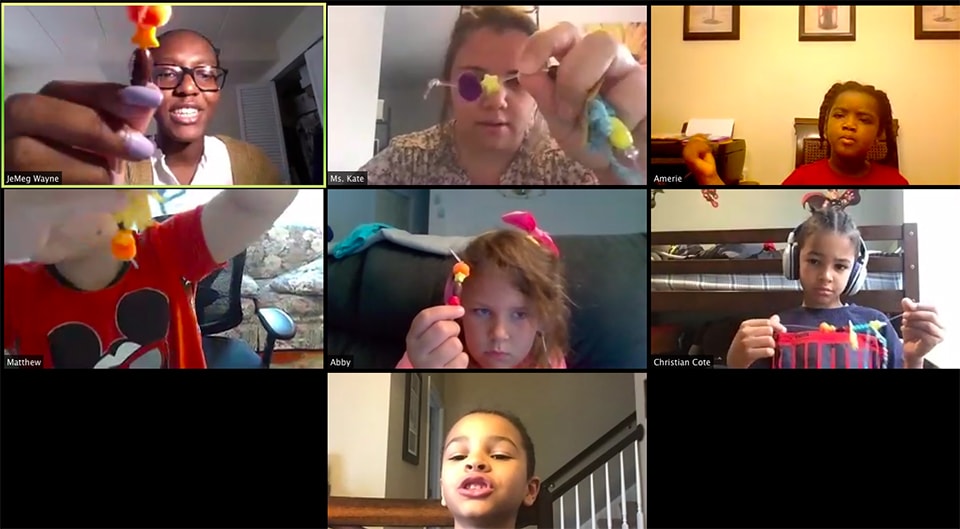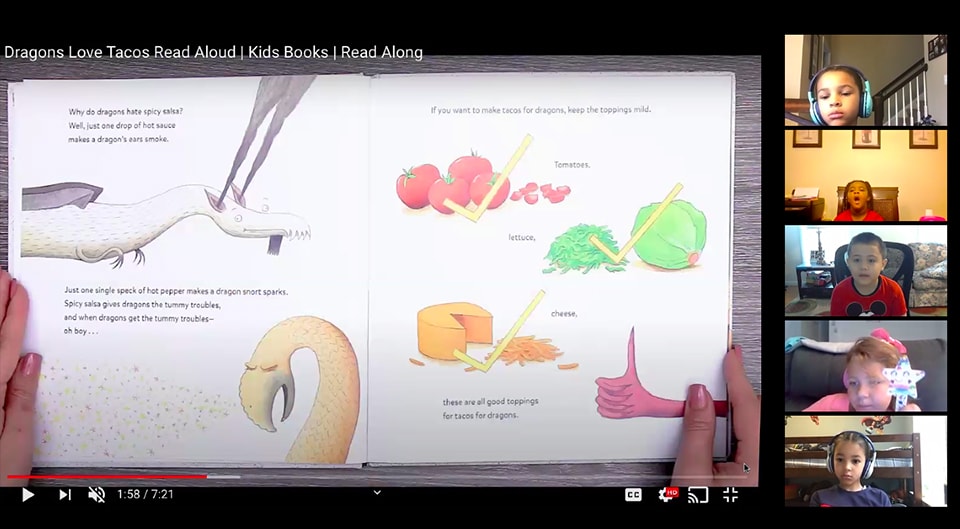Resiliency is key to transition to virtual services
The Loyola Clinical Centers provides effective virtual services during COVID-19
When faced with adversity during the COVID-19 pandemic, faculty and graduate students at the Loyola Clinical Centers (LCC) were tasked with moving operations entirely online to support clients and assist the community.
“The faculty at the LCC took on the task of not only delivering services to their clients via telehealth/telepractice, but also the excellent training of our graduate students in psychology, speech-language-hearing, and literacy,” said Kara Vincent, ’91, M.S., ’93, executive director of the LCC.
Despite the unprecedented challenges presented by the pandemic, many LCC programs continue to offer services, have successful sessions, and receive positive client feedback.
LiveNow, a company that provides telepractice training and services, was instrumental in equipping Loyola graduate students and faculty to support clients through virtual sessions, said Andrea Atticks, ’98, division director of speech-language-hearing division at the LCC.
“The efforts of our faculty and students and their ability to adapt in these circumstances are what allowed the LCC to thrive,” said Vincent.
Virtual St. Mark Summer Program
In addition to its clinical services, the LCC developed an engaging and interactive summer literacy program for school-aged children and adults.
Mary Lee Walls, ’88, a speech-language pathologist and clinical supervisor, started a Reading Readiness Program and Articulation program at St. Mark Catholic School in Catonsville, Md., in 2013. With the help of Lisa Tolino-Hill, ’92, M.S. ’98, speech-language pathologist and clinical supervisor, and many Loyola graduate students, the team translated this program online to offer children an engaging virtual experience this summer.
One of the benefits of moving to the virtual platform is the geographical range we can reach,” Walls explained. “The creativity of the graduate students carrying out instruction virtually is impressive and requires a tremendous amount of planning—and the excitement of the children makes it all worth it.
The 2020 program consisted of a series of group therapy sessions offered via telepractice using a HIPAA-secure Zoom platform. Sessions focused on Reading Readiness, Reading Comprehension, and written language for students entering kindergarten through sixth grade.
“The primary goal of this program is to engage students with reading and writing activities that are fun, purposeful, and thought provoking,” said Tolino-Hill. “We can, and do, teach them specific strategies that help them comprehend what they read, as well as ways to generate and expand their ideas in writing. A huge piece of engagement depends on the environment we create; a place where we model excitement about reading/writing, where they know their ideas are important, and where they have the time and opportunity to share their ideas.”


Loyola graduate speech-language pathology clinicians provide instruction under the supervision of Hill and Walls, both licensed and certified speech-language pathologists. The Reading Readiness Skills sessions (for students entering kindergarten through third grade) used a small group to target phonological awareness, letter and sound association, and application to literacy. The Reading Comprehension and Written Language sessions (which were added this summer and were for students entering grades 4-6) focused on development of reading comprehension, narration, and writing skills.
Students and parents expressed their deep satisfaction with this year’s summer program.
“This year, the clinicians are juggling the content and rigor of pre-reading skills and the challenge of working in a virtual forum,” said Elyssa Burk, a parent of a student enrolled in the St. Mark program.
“Based on our experience last year, we had no doubts about enrolling again for this summer, even though we were entering the uncharted waters of the COVID-19 lifestyle. We know there is a mammoth learning curve for the transition from live to virtual, but from our perspective, it has been seamless. We are truly impressed.”
Virtual Govans Elementary Summer School
In addition to the St. Mark Summer Program, the LCC worked with Govans Elementary School to provide a virtual program for middle schoolers and rising sixth graders. The Govans summer program included sessions related to speech-language pathology, psychology, and wellness.
We were excited to have the opportunity to provide such support despite the barriers of COVID-19…We think this summer especially was important for children to have the tools to manage their emotions.
Clinical instructors and speech-language pathologists Marissa Kleiman and Jill Keller worked to develop the seven-week speech-language pathology virtual sessions. The sessions targeted vocabulary and reading comprehension for the eight student participants. Students were tasked with learning how to use a remote platform including asking and answering questions.
In addition to the speech-language pathology sessions, students were engaged in a five-week virtual wellness program.
Hadley Cornell, M.S.’06, Psy.D., ’09, clinical assistant professor of psychology and division director of psychology at the LCC, taught the wellness portion of the program.
“This wellness camp offered students skills in managing emotions, such as coping skills and mindfulness techniques,” said Cornell. “We were excited to have the opportunity to provide such support despite the barriers of COVID-19, especially due to the added stresses that COVID-19 has brought. We think this summer especially was important for children to have the tools to manage their emotions.”
Services for Adults
In addition to the programs for the pediatric population, telepractice sessions for adult clients were also held virtually.
Mental wellness workshops through the LCC started online in April. The Baltimore Neighbors Network partnered with the LCC to provide wellness checks on residents in the communities near Loyola. During these calls, residents were invited to these virtual workshops, during which participants discussed approaches for enhancing and maintaining mental wellness for themselves and/or others during the pandemic.
Cindy Nichols, ’80, and Theresa Alexander, ’03, M.S. ’05, clinical faculty and speech-language pathologists, also held large telepractice therapy groups and individual sessions for aphasia patients and clients who have or have had neurological disorders. These sessions—which also began online in April—included 15-17 participants per week. The sessions serve a vulnerable population in terms of health risks, and the option for online meetings has increased safe and comfortable access for many who are able to log in from their homes in Baltimore, across the State of Maryland, and as far as West Virginia.
Nichols and Alexander created a virtual Aphasia Choir, which was formed in 2018, where participants could sing with others via Zoom. Choir members enjoyed the online format and asked for more time to chat among themselves after the weekly sessions.
“I think these virtual sessions are a great use of the technology,” said Nichols. “We plan to continue to offer them in the fall for our clients. The virtual experience has been well-received by our clients and has been great for our community members who live far away and have other restrictions.”
While the LCC is opening for hybrid services this fall with a limited number of face-to-face services, most of the client sessions will continue online through the fall semester.
“Through all the uncertainty, resilience was and continues to be key,” said Vincent. “We are all facing challenges, both personally and professionally, but at some point during these unprecedented times, my hope is that each of us can stop, take a breath, and feel good about what we have each given to Loyola and our extended community. We have a long, uncertain road ahead, but with continued collaboration and grit, we will get through this.”
Learn more about the Loyola Clinical Centers